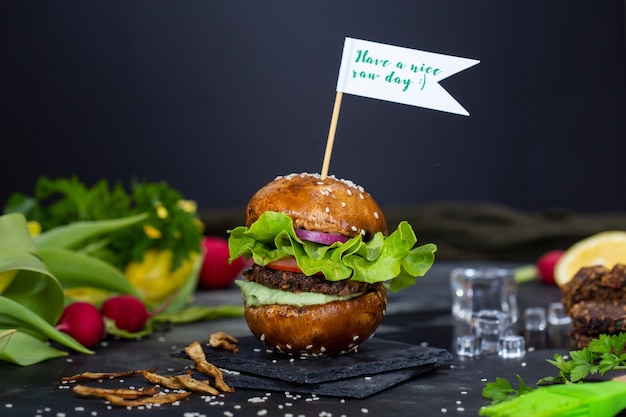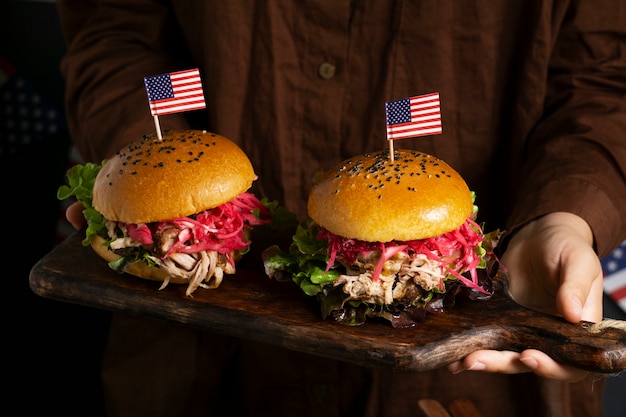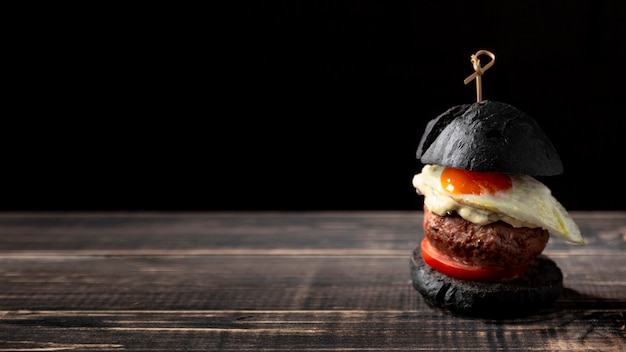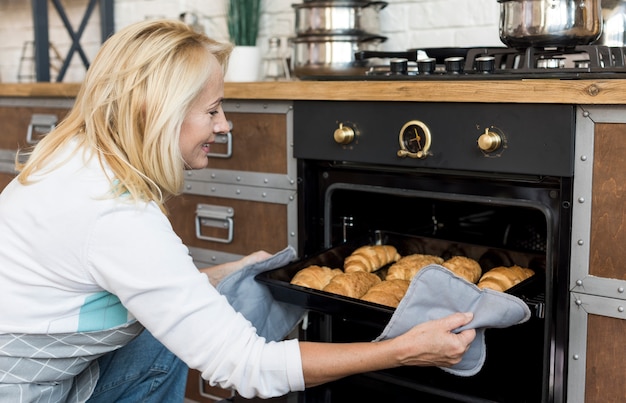Ah, burgers. Those juicy, satisfying patties that send our taste buds into a frenzy. But achieving that perfect medium-rare, the kind that melts in your mouth and leaves you craving more, isn't always a simple task. It's an art form, a culinary dance with heat, time, and a touch of intuition. I've spent years experimenting, grilling, and occasionally, I admit, overcooking, to finally master the art of the medium-rare burger.
This isn't just a recipe; it's a journey. A peek into my burger-making world, filled with tips, tricks, and personal anecdotes that'll help you avoid my earlier blunders and become a burger master yourself. We'll explore the science behind that luscious pink center, the secrets to a perfectly crispy crust, and the art of choosing the right toppings for a truly unforgettable experience. So, grab a cold drink, fire up your grill, and let's dive into the world of the medium-rare burger.
(Part 1) Understanding the Basics

The Temperature Tango
"Medium-rare" isn't just a fancy term; it's a specific internal temperature. For a burger to reach that coveted medium-rare status, it needs to hit an internal temperature of around 130°F (54°C).
Now, you might be tempted to trust your eyes, to rely on that familiar "done-ness" blush. But trust me, it's not as foolproof as it seems. A burger can appear perfectly cooked on the outside, yet hide a raw, even bloody, interior. This is where the trusty meat thermometer becomes your best friend. No more guesswork, just scientific precision.
The Power of Fat
You can't just slap any old meat on the grill and expect a juicy masterpiece. choosing the right cut is key. For a medium-rare burger, your best friend is ground beef that's 80% lean with 20% fat. Now, don't shy away from that fat! It's not the enemy; it's the hero. Fat is what gives your burger its luxurious juiciness, its melt-in-your-mouth texture, and that irresistible flavor. So embrace it, and your taste buds will thank you.
(Part 2) Preparing the Patties

Hand-Sculpting Perfection
Once you've got your ground beef, it's time to craft those patties. You can use a patty press, but I prefer the tactile experience of shaping them by hand. It gives me a sense of control, ensuring a consistent thickness and a nice, even patty.
My secret is to use a light touch. Don't overpack the meat. You want a patty that's firm but still has a slight give. Remember, a slightly smaller patty cooks faster and more evenly, ensuring perfect doneness throughout.
Flavor Bombs
Now, let's add a touch of magic. Don't be shy with the seasoning! I prefer to keep it classic with salt and pepper, but you can unleash your inner culinary artist with other spices, like garlic powder, onion powder, or paprika. Feeling adventurous? Try a dash of smoked paprika for a hint of smokiness, or some dried herbs for a touch of freshness.
A Bit of Patience
Once you've seasoned your patties, don't jump straight into grilling. Give them a 30-minute rest in the fridge. This helps the meat firm up, making it easier to handle and ensuring even cooking.
(Part 3) Cooking the Burger

Choosing Your Weapon
Now comes the exciting part - the cooking method! I'm a grill enthusiast, but if you prefer a stovetop experience, a cast-iron skillet or a pan will do just fine. No matter your choice, make sure your cooking surface is piping hot.
For a grill, medium-high heat is your friend. This ensures a beautiful sear, creating a crispy, flavorful crust.
The Art of Flipping
Here's a pro-tip: Resist the urge to constantly peek at your burgers. Let them cook undisturbed for a few minutes until a nice, golden crust forms. Then, and only then, flip them once. Just once.
This technique is crucial for juicy burgers with a delightful crust. The fewer flips, the better. Trust me.
Temperature Control
Remember that thermometer? Now's the time to put it to good use. Insert it into the thickest part of the patty, being careful not to touch the bottom of the grill.
Aim for that medium-rare sweet spot, 130°F (54°C). Once you hit that temperature, your burger is ready to be crowned the king of your culinary kingdom.
(Part 4) Resting and Serving
A Moment of Calm
After cooking, don't rush to devour your creation. Give it a few minutes to rest. This allows the juices to redistribute throughout the patty, resulting in a more flavorful, juicy, and satisfying burger.
Bun Bliss
Now, let's talk buns. A soggy bun is a burger tragedy, so toasting is a must. It adds a delightful crunch and prevents the bun from absorbing all those precious burger juices.
Top It Off
Your burger is cooked, your bun is toasted, and now it's time for the crowning glory: the toppings. The possibilities are endless, but I'm a classicist at heart: lettuce, tomato, onion, and a generous dollop of mayonnaise.
Ingredient Obsession
For me, sourcing the perfect ingredients is an art form. A good burger starts with good beef. Find a butcher who grinds their own meat and don't be afraid to chat with them, learn about their techniques.
For toppings, I embrace seasonality. In summer, fresh tomatoes and lettuce are my go-to. In winter, I reach for roasted red peppers and caramelized onions.
The Final Bite
The last step, and arguably the most important: enjoy! Sink your teeth into that perfectly cooked, juicy burger, and savor every delicious bite.
(Part 5) Tips and Tricks for the perfect burger
Fat vs. Lean
You're probably wondering, "How much fat is just right?" It depends on your preference.
For a classic burger, 80% lean with 20% fat is the sweet spot. But for a truly juicy, decadent experience, go for 85% lean with 15% fat. Remember, more fat equals more juiciness.
Crispy Crust Secrets
To achieve that beautiful, crispy crust, you need high heat. The hotter the grill, the better the sear. Just be sure to keep an eye on the internal temperature, you don't want to overcook your masterpiece.
Doneness Decoded
We've already explored medium-rare (130°F), but what about other levels of doneness?
| Doneness | Internal Temperature (°F) | Internal Temperature (°C) |
|---|---|---|
| Rare | 120-125 | 49-52 |
| Medium-Rare | 130-135 | 54-57 |
| Medium | 140-145 | 60-63 |
| Medium-Well | 150-155 | 66-68 |
| Well-Done | 160 | 71 |
Avoiding Burger Dryness
No one wants a dry, tough burger. To avoid this, start with the right cut of meat. Remember, fat is your friend.
Second, don't overcook. As soon as the burger reaches your desired temperature, remove it from the heat.
Third, let it rest. This allows the juices to redistribute, ensuring a juicy, flavorful burger.
(Part 6) Mastering the Grill
Grill of Choice
When it comes to grilling burgers, you have options:
Gas Grill: These are convenient, offer consistent heat, and allow easy temperature adjustments.
charcoal grill: For a smoky, authentic flavor, charcoal is the way to go. However, it takes a bit more time to heat up.
Cast-Iron Skillet: If you lack a grill, a cast-iron skillet is a fantastic alternative. Just make sure it's blazing hot.
Grilling with Precision
No matter your grill choice, there are essential techniques to master:
Preheat: Always preheat your grill to ensure even cooking.
Clean: Wipe down the grates with a clean brush to remove any residue.
Oil: Lightly brush the grates with oil to prevent sticking.
Heat Control: Adjust the heat as needed to maintain consistent cooking.
One Flip Rule: Flip those patties only once, after a delicious crust has formed.
Temperature Monitoring: Check the internal temperature regularly to ensure it reaches your desired doneness.
(Part 7) Alternative Cooking Methods
Pan-Fried Perfection
Not everyone has a grill, and that's okay. Pan-frying delivers delicious results too. Use a cast-iron skillet or heavy-bottomed pan, heat it over medium-high heat, and add a touch of oil.
Once the pan is smoking hot, add your patties and cook for 3-4 minutes per side, or until cooked to your liking.
oven-baked burgers
For a healthier option, bake your burgers. Preheat your oven to 400°F (204°C). Place the patties on a baking sheet lined with parchment paper and bake for 15-20 minutes, or until they reach your desired level of doneness.
(Part 8) FAQs
1. How do I ensure my burger cooks evenly?
Meat Thermometer: This is your most reliable tool for even cooking.
Preheated Grill: Consistent heat is key.
One Flip Rule: Minimize flipping to avoid interrupting the cooking process.
Smaller Patty: A smaller patty cooks faster and more evenly.
2. How do I prevent a dry burger?
Fat is Your Friend: Choose a ground beef with a higher fat content (80% lean, 20% fat or more).
Doneness is Key: Check the internal temperature frequently and remove the burger from the heat as soon as it reaches your desired level of doneness.
Rest Time: Let the burger rest for a few minutes before serving to redistribute the juices.
3. What are the best toppings for a medium-rare burger?
Classic: Lettuce, tomato, onion, mayonnaise
Cheesy: Melted cheddar, Monterey Jack, or Swiss cheese
Spicy: Jalapenos, hot sauce, or chili peppers
Sweet and Savory: Caramelized onions, bacon, or roasted red peppers
4. How do I store ground beef properly?
Refrigerate: Store ground beef in the refrigerator for up to 2 days.
Freeze: To freeze, place the ground beef in a freezer-safe container or bag and freeze for up to 3 months.
5. Any other burger-cooking tips?
No Pressing: Avoid pressing down on the patty, as this will squeeze out the juices and make your burger dry.
Season Generously: Salt and pepper are essential, but feel free to add other spices to your liking.
Bun Quality: A soft, fluffy bun is essential for a truly satisfying burger.
I hope this guide has empowered you to cook the perfect medium-rare burger. Remember, practice makes perfect. Experiment with different cooking methods, seasonings, and toppings to discover your ideal burger. And most importantly, have fun! You might just discover a new favorite, one bite at a time.
Everyone is watching

Prime Rib Roast Cooking Time Chart: Per Pound Guide
Cooking TipsPrime rib roast. Just the name conjures images of lavish dinners, crackling fires, and hearty laughter. It’s ...

How Long to Bake Potatoes in the Oven (Perfect Every Time)
Cooking TipsBaked potatoes are a staple in my kitchen. They're incredibly versatile, delicious, and surprisingly easy to m...

Perfect Rice Every Time: The Ultimate Guide to Cooking Rice
Cooking TipsAs a self-proclaimed foodie, I've always been a bit obsessed with rice. It's the foundation of countless cuisi...

The Ultimate Guide to Cooking Asparagus: Tips, Techniques, and Recipes
Cooking TipsAsparagus. The mere mention of this spring delicacy conjures up images of vibrant green spears, crisp and burs...

Ultimate Guide to Cooking the Perfect Thanksgiving Turkey
Cooking TipsThanksgiving. Just the word conjures up images of overflowing tables laden with delicious food, the scent of r...
